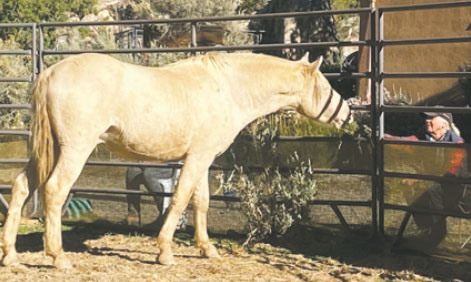
The writer gives hay to Marvel, a stallion that was captured and removed from Mesa Verde National Park.
This issue of the Free Press speaks to the horse and bison problems on public lands and in our National Parks. Much has been written, debated, speculated and discussed (loudly) concerning the “issues” of wild/feral horses on the federal lands. There is some level of federal protection and still a larger problem of range management and herd control. I’ll leave the data messaging to those with the hard facts (presented in this paper and others).
Why are so many emotions evoked over wild horses? In my humble opinion it is because horses simply draw emotion out of us mere humans. Horse people. We are legion. Some have horses and many do not. It seems that many humans simply love them for inexplicable reasons.
I am a horse person. I was born a horse person before I ever set eyes on an equine. Forget dolls. I only wanted to play with toy horses and rode my home-made stick horse madly through the house. I have no reason why I (and countless others) gravitated to horses as children. In moments when I wonder why I need this expensive and dangerous habit, I figure I was some kind of ancient scout on horseback hundreds of years ago. Or is it a gene quirk? Character flaw? Some kind of undiagnosed mental illness? I think my husband is leaning towards it being mental illness after seeing a bill for a sick horse.
I have heard horses described as mythical, magical, pests and an invasive species (and everything in-between). Like horses, horse people come in every size, shape and form. Horse people firmly adhere to their particular discipline or idea of what a horse should do, how they should be trained, how they should be fed, shoed and ridden. Passions rise and personalities clash. I have seen as many blow-ups and unfortunate explosions among horse people as I have with politics. It has made me deeply sad to see splits and fractures in horse communities I love and support.
Why does this happen? Horses, of course. We care about horses. Once a horse is in your heart they are embedded forever. They have tolerated us for centuries. It has only been recently that the horse culture has taken another look at how sensitive and willing these creatures are. Training has been evolving from “breaking” a horse to “starting” a horse. Who wants to be broken? Clicker training is a successful new discipline now promoted by highly respected equine professionals (FYI…A very dear friend and I once decided to write a book on clicker training for husbands. We absolutely knew it would be a bestseller but sadly were not able to finish it and become famous.)
Horses are expensive, dangerous and work intensive (mama, don’t let your daughters grow up to be cowgirls). I would not trade it for anything. I work like a Trojan lifting hay and scooping poop. I agonize over the right feed, supplements, foot care and exercise. I read the latest horse health articles and study biomechanics. Yes… this is a sickness.
Many of the wild ones do not get this kind of care or concern. Home may not be on the range. The lucky ones may become a companion horse at a therapy center, work as a mounted patrol, be a trusted trail horse or wind up as dressage star. Sadly, others will live their lives out in confined holding pens or, in the worst case, sent to illegal slaughter in Mexico.
How can we solve the wild horse problem if we can’t come together with common goals and calm minds?
My humble answer is education. We need information, facts and data to drive solutions. There is a new approach to humanely gathering horses. It’s called the Low Stress Gather method by Whit Hibbard. This is just one solution to costly taxpayer-funded round-ups. Mesa Verde and Teddy Roosevelt national parks have successfully initiated this program. It is data-driven and science-based. The concept in this method is “calm mind and low stress for both horse and human.” How cool is that?
I have no illusion all horse supporters will someday hold hands and sing kumbaya. I do wish we could stop fighting among ourselves and band together to find solutions to a problem in both our state and country. The success of the Spring Creek Basin Herd in Disappointment Valley is a shining example of what can be done for successful range and herd management. Mesa Verde is working towards a different paradigm in removing and rehoming their horse population. It took years of collaboration and education to support these efforts. It is my sincere desire these methods will expand across the country and new solutions can be discovered and implemented.
If you have an interest or concern about wild horses, please educate yourself. There are books to be read and forums to be explored. There are organizations to financially, physically or morally support. Our ranges are shrinking and we need to utilize all scientific and data-driven research available to manage them and the creatures that roam free on them.
One day in frustration I told my husband I was getting out of the horse business. He took my face in his hands and gently said, “Horses are not what you do… they are who you are.”
He is right. I write this essay because I, and I know many of you, care and love these beautiful and wise animals.
Nancy Schaufele writes from Montezuma County, Colo.


